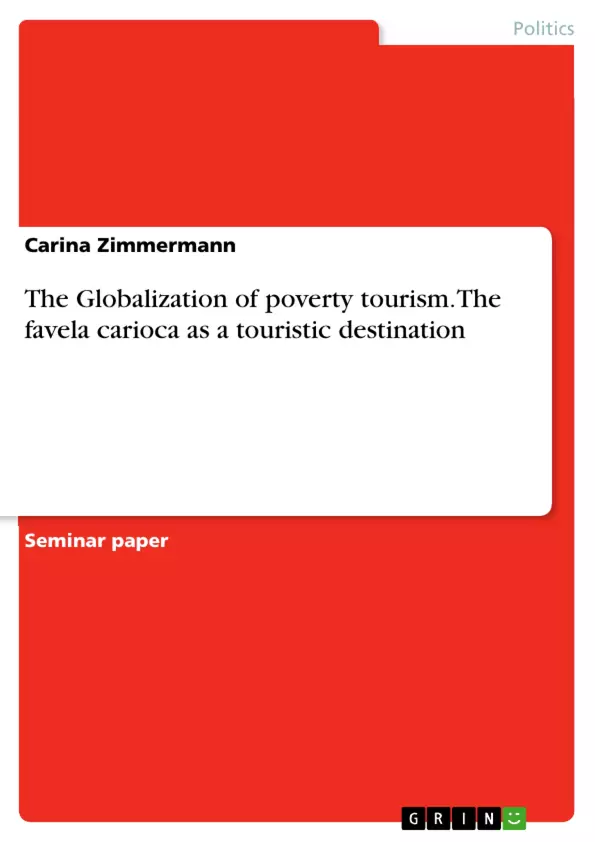The purpose of this paper is to describe the favela tourism in Rio de Janeiro as a globalized phenomenon in the context of ethic debates. Is favela tourism good or bad? Is it ethical to gaze at poor people and to take pictures of their houses? Is poverty tourism exploitation? Do slum tours profit of the tour? Is the favela tourism in the favor of the community? In the case of Rio: does the favela tourism help to integrate the favelas into the former city?
Poverty tourism is a complex and globalized phenomenon. The location Rio de Janeiro was chosen because of the peculiarity of its topography and history and because of a personal interest by the author. Furthermore, Rio's favelas have always been the focus of a more alternative type of tourism and due to the violence they have never been part of the traditional tourism. But since the movie Cidade de Deus (2002) the favelas as a touristic destination gained importance.
Inhaltsverzeichnis (Table of Contents)
- Introduction
- Poverty tourism and ethic debates
- The connection between poverty and tourism
- Favela tourism and ethic debates
- History and development of Rio's favelas
- Multiplicity and diversity of the favela
- Development of Rio's favelas and favela politics
- The different facets of the favela: stigmatization, segregation and crime vs. popular favela culture
- Segregation and race
- Favela brand, a globalized phenomenon
- Favela tourism in Rio-what about ethics?
- Favela carioca as a tourist destiny
- Who visits the favela and why?
- Tourism in the biggest favela of Rio
- The voice of the Rocinha's Resident
- Vantages and disadvantages of the favela tourism
- Conclusion
Zielsetzung und Themenschwerpunkte (Objectives and Key Themes)
This paper explores the phenomenon of favela tourism in Rio de Janeiro, examining its ethical implications and place within the broader context of poverty tourism. It investigates the historical, social, cultural, and political factors that have shaped the development of favelas in Rio and how these factors contribute to the rise of favela tourism. The paper also examines the perspectives of both tourists and favela residents, analyzing the potential benefits and drawbacks of this form of tourism.
- The history and development of favelas in Rio de Janeiro
- The ethical implications of favela tourism
- The impact of favela tourism on the favela communities
- The motivations and perspectives of tourists visiting favelas
- The role of poverty tourism in a global context
Zusammenfassung der Kapitel (Chapter Summaries)
- Introduction: This chapter introduces the topic of favela tourism in Rio de Janeiro, highlighting the city's importance as a tourist destination and the contrast between its official image and the reality of its favelas.
- Poverty tourism and ethic debates: This chapter defines poverty tourism and explores its historical development, examining the ethical concerns surrounding the practice of visiting impoverished areas for tourism purposes.
- History and development of Rio's favelas: This chapter provides a detailed account of the history and development of Rio's favelas, exploring their diversity, political context, and social dynamics.
- The different facets of the favela: stigmatization, segregation and crime vs. popular favela culture: This chapter examines the complex social realities of favelas, addressing issues of segregation, racial disparities, and the perception of favelas as dangerous and crime-ridden, while also highlighting the vibrant and resilient culture that exists within them.
- Favela tourism in Rio-what about ethics?: This chapter focuses specifically on favela tourism in Rio, exploring the motivations of tourists, the role of tour operators, and the perspectives of favela residents regarding the benefits and drawbacks of this form of tourism.
Schlüsselwörter (Keywords)
Favela tourism, poverty tourism, ethical considerations, Rio de Janeiro, favela communities, slum tourism, social inequality, globalization, cultural representation, urban development, tourism industry, community development, social impact.
Frequently Asked Questions
What is poverty tourism and how is it defined in the context of Rio de Janeiro?
Poverty tourism, also known as slum tourism, is a globalized phenomenon where tourists visit impoverished areas. In Rio de Janeiro, this specifically refers to tours of favelas, which have gained popularity as touristic destinations since the early 2000s.
Is favela tourism ethical?
The ethics of favela tourism are a subject of intense debate. Key concerns include whether it is ethical to "gaze" at poverty, if the tours represent exploitation, and whether the local community actually benefits from the presence of tourists.
What role did the movie "Cidade de Deus" play in favela tourism?
The 2002 movie "Cidade de Deus" (City of God) significantly increased global awareness of Rio's favelas. Following its release, these areas transitioned from being avoided due to violence to becoming important alternative touristic destinations.
Does favela tourism help integrate these communities into the rest of the city?
One of the central questions explored is whether tourism aids in breaking down social barriers and integrating favelas into the formal urban structure of Rio, or if it reinforces segregation and stigmatization.
What are the motivations for tourists to visit a favela?
Tourists are often motivated by a desire for "authentic" experiences, an interest in popular favela culture, or a wish to understand the social realities and inequalities of Rio de Janeiro beyond the traditional tourist sites.
What do favela residents think about tourism in their neighborhoods?
Perspectives vary; while some residents see tourism as an opportunity for economic development and cultural representation, others may view it as intrusive or a form of social voyeurism.
- Citar trabajo
- Carina Zimmermann (Autor), 2014, The Globalization of poverty tourism. The favela carioca as a touristic destination, Múnich, GRIN Verlag, https://www.grin.com/document/339762



